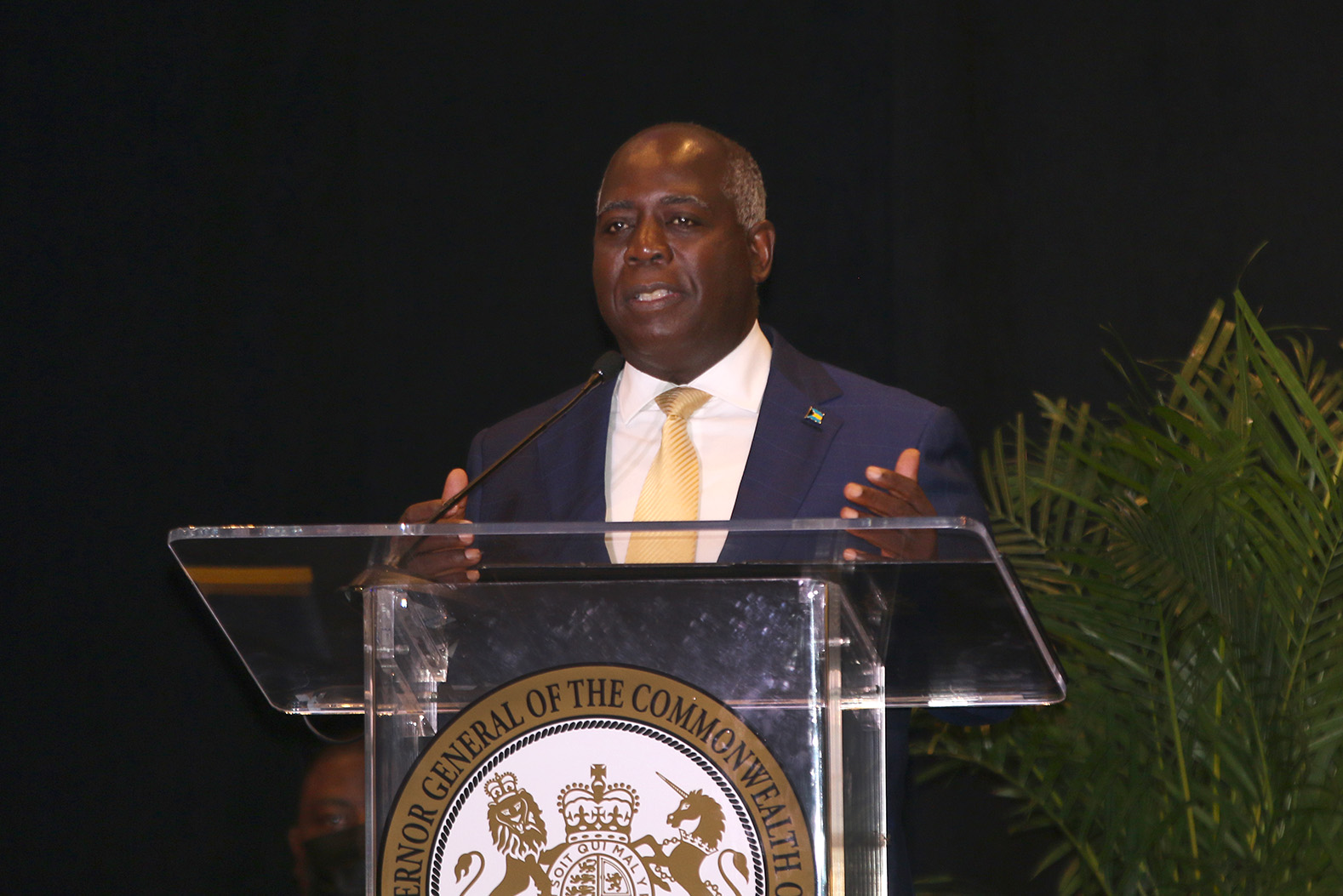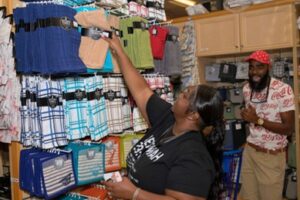SATURDAY, 25 SEPTEMBER 2021
“Building resilience through hope – to recover from COVID-19, rebuild sustainably, respond to
the needs of the planet, respect the rights of
people and revitalize the United Nations” Introduction
#TheBahamas, September 26, 2021 – Esteemed Colleague Heads of State and Heads of Government, Distinguished Delegates, Ladies and Gentlemen;
Secretary-General, Antonio Guterres;
President of the General Assembly, Foreign Minister Abdulla Shahid of the Maldives:
On September 16th, Bahamian citizens took to the polls to make their voices heard. It is an honour to meet with you fewer than ten days after this peaceful exercise of the democratic process.
I wish to extend congratulations to the
Maldives, a sister Small Island Developing State, on their election to the helm of this General Assembly. Know that you will find The Bahamas to be a strong, engaged and thoughtful partner for the road ahead.
We also congratulate Secretary-General Gutteres on his re-election to a second term, and wish him every success.
Colleagues, we are meeting at a most extraordinary time. We come here from different corners of the earth, with our theme — “building resilience through hope” – reflecting our shared determination to pivot from crisis to opportunity. 
These crises are inter-connected and multifaceted, and need a global response. We must collaborate to end the Covid-19 pandemic and address public health issues.
We must co-operate to mitigate the effects of climate change.
And access to development financing must be equitable and fair.
An inadequate response to these issues will have dire consequences for the global economy.
Collaborating to End the Pandemic
The world has changed enormously since we first learned about the COVID-19 virus.
This crisis made abundantly clear what has always been true: we’re all in this together.
In every country, we have lost loved ones. We have seen our healthcare workers battle bravely. We have contended with disruption, uncertainty, and grief.
We have benefited from extraordinary cooperation and achievements in science, but we also had to contend with misinformation and disinformation, and insufficient attempts to curb bad actors propagating the same. Bad information has flowed across borders, undermining public health and public trust.
The pandemic has been very difficult for countries like mine. We face an extraordinary need for new resources in health and education and housing just as our economy is contracting dramatically.
Our inter-connected world means that we will only be safe when all countries, including mine, have the tools needed to fight this virus.
This requires the equitable distribution of vaccines. That includes distribution to Small Island Developing States, who are not manufacturers. Stockpiling for self-preservation is a fallacy.
You will only be safe when we are all safe!
I wish to thank the Government and People of the United States for their donations of vaccines to The Bahamas and the wider Caribbean region.
This gift, alongside donations received previously from India, China, Antigua & Barbuda, and Dominica, will save many Bahamian lives. This is in addition to the ongoing support of PAHO, CARPHA and the COVAX facility and the regional collaboration among CARICOM countries.
But this is still not enough. We need more. Our demand for vaccines has significantly outstripped supply.
Along with vaccines, it is important that safe treatments and therapeutics, are made accessible and designated as public goods. We need to fortify critical global supply chains, and distribution mechanisms, so that we can win this battle, and be better prepared for the next one. You will only be safe, when we are all safe! The Bahamas joins those reiterating the need to fully fund the ‘Access to COVID-19 Tools Accelerator’ and its COVAX facility. And we reiterate our alignment with CARICOM’s call for continued high-level engagement to urgently address access to vaccines.
When vaccines are deployed to reduce transmission, everyone is made safer – not just the direct recipient. We can, by doing so, reduce the opportunities for new and more dangerous variants to emerge. This virus is global and requires a global response. COP26 Matters/ Disasters Response
Colleagues, even before COVID-19 shut down my country’s borders, we were dealing with a catastrophic shock to our economy and our country.
Two years ago this month, one of the strongest storms ever recorded in the Atlantic caused catastrophic damage to our islands of Abaco and Grand Bahama.
Hurricane Dorian was strengthened by waters that were well above average temperatures; the earth’s changing climate means that hurricanes like Dorian linger longer and cause more damage.
The devastation caused by this storm is part of our country’s landscape; the physical and emotional wreckage are still with us.
Recently I spoke with a woman who lost her husband and her three children in the storm. Every rainfall is a reminder of the horror. How can we continue to do nothing in the face of such tragedy?
The very worst thing about Dorian is our sense of foreboding – our sense that this hurricane, which took so much from so many – is only the beginning.
None of us believe this is a once-in-a-generation storm. Instead, we know it is a nightmare that could easily recur – tomorrow, next week, next month.
To any leader who believes we still have plenty of time to address climate change, I invite you to visit Abaco and Grand Bahama.
For island nations such as ours, climate change is here. And is a real and present danger.
Before Hurricane Dorian in 2019, we faced hurricanes: in 2015, in 2016, and in 2017. We cannot survive this “new normal”.
Thus, we are not here to call for measured steps. We are here to say that big and radical change is the only response that can save our country. We are out of time.
We stand with CARICOM countries and Small Island Developing States to remind the world that those who are hit hardest by the impact of climate change, are the least responsible.
The recent Intergovernmental Panel on Climate Change (IPCC) Report warned that avoiding the worst outcomes requires immediate action; this is, as the Secretary-General noted, a ‘Code Red’ moment.
Our countries disproportionately bear the burden of the “Recovery Trap”, in which we attempt to rebuild to the tune of billions – billions we never had, even before COVID.
Colleagues, in a few short weeks, we will meet in Glasgow, Scotland.
The 26th Climate Change Conference cannot be like the twenty-five that preceded it – we cannot pretend that incremental change is sufficient. We cannot set goals we have no intention of meeting. We cannot keep postponing the change we need for countries like mine to survive.
If we are the serious leaders these times require, we must raise our ambitions, and make real commitments to cut emissions.
We must make real progress on bridging the divides in investment, and access-to-technology and skills, especially in areas relevant to climate mitigation and adaptation.
We must strengthen technical assistance for creating, nationally-determined contribution (NDC) commitments, along with commensurate ‘implementation financing’.
We must give teeth and substance to the mechanism for loss and damage if it is to be a meaningful tool for supporting fair recovery, and not simply an exercise in defining and highlighting disaster risk.
Along with our sister nations in CARICOM,
The Bahamas calls for greater climate financing and the need for more engagement and progress on a Climate Investment Platform.
And, as a matter of priority, more innovative financing and debt solutions are needed, including debt for climate adaptation swaps. We also look forward to the capitalization of a Caribbean Resilience Fund. We also need adequate resourcing and timely access to the ‘Green Climate Fund’ and the ‘Climate Finance Accelerator’.
In our just-concluded campaign, we called for new renewable energy initiatives in our own country. We are going to build structural and economic resilience, in a green recovery, with plans to invest in climate-smart infrastructure and environmental protection.
The Bahamas will lead on wetland and ocean preservation, and we will seek re-election to the International Maritime Organization. We look forward to the Biodiversity Conference
next month; we are committed to the successful conclusion of negotiations towards an international treaty to conserve marine bio-diversity. Advancing an MVI/ Affordable, Accessible Development Financing
Colleagues, the compounding impact of economic, environmental, and now public health shocks, means that access to affordable finance will be the real driver of progress in the near and long term.
The global development financing gap for meeting Sustainable Development Goals by
2030, estimated in 2019 to be $2.5 trillion, is only increasing.
Today we reiterate our country’s support for the inclusion of a Multi-dimensional Vulnerability Index in the decision-making of international financial institutions, and the international donor community.
On a related front, we believe that access to the global financial system and tax cooperation should not be undermined: by ad hoc and consistently shifting and arbitrary goal posts, and threats of exclusion from the global economy.
Financial Services is a crucial component of the Bahamian economy. We see an indispensable role for the UN in leveraging its universal jurisdiction for greater oversight of global antimoney laundering, de-risking and tax cooperation matters.
Cuba
On a separate note, I wish to convey The Bahamas’ rejection of the ongoing economic blockade of our sister Caribbean nation of Cuba.
Conclusion
As I conclude, I recall the words of our nation’s first Prime Minister, Sir Lynden Pindling, as he stood here 48 years ago this month, on the occasion of our nation’s accession to the United Nations.
He spoke about the journey of our people, from slavery to colonialism to sovereign independence.
He spoke of our country’s wish to be neither dominated nor coerced, and our wish to build friendships with nations who respected our freedom.
He could not have foreseen at that time the challenges we face today, with intensifying hurricanes and a deadly virus that has left no nation untouched. But he saw already that “no nation is an island unto itself” and spoke of the interdependence of all countries. That interdependence has never been clearer.
Rest assured, colleagues, that in The Bahamas you will find a trusted partner, committed to moving forward on our collective goals for sustainable development, security, and peace.




















